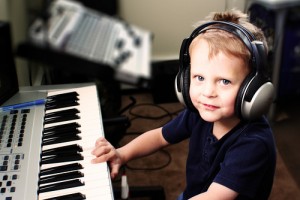I’m very often consulted about which type of piano is appropriate for a beginner student to start lessons on. In a perfect world, every student would have a Steinway Grand piano. However, that is not feasible from a financial or practical standpoint for most people.
When I was a kid taking my first piano lessons, my parents rented a 66 key keyboard for me for the first 6 months. Next they purchased a digital piano. Then I got an upright piano, and finally (at age 16), I received a grand piano, which I still take great joy in playing on today.
While playing on an actual piano is almost always better, starting on a keyboard is perfectly acceptable for beginners. Pianos are a big investment. Starting on a keyboard allows you to see how much your children enjoy playing and their level of commitment before you put down more money for a better quality instrument.
While the sound, touch, tone quality, and capability of a piano to make gorgeous music are endless, pianos do have a few downsides. These include:
- Pianos take up a lot of space. To make room for a piano you might need to entirely rearrange the furniture in one of the rooms in your house.
- They are extremely heavy and are difficult to move without the assistance of professional piano movers.
- They need to be tuned at least once a year. Tunings can easily cost $100+/ tuning.
- If the piano is in poor condition the cost of repair and maintenance can be steep. The less the piano has been cared for during it’s lifetime, the higher the cost will be to restore and maintain it.
On the other hand, the upsides of owning a keyboard include:
- Kids have fun changing the instrument sounds and exploring the fun sound effects that can be played with on a keyboard. Many of my students love recording themselves playing.
- Keyboards are portable. If you end up getting a piano down the road, it’s great to keep the keyboard to keep elsewhere in the house (like in the basement) for when your kids feel like playing with the sound effects. It’s also great to bring the keyboard to your vacation home, so your kids can practice when they’re away from home.
- Headphones. With a keyboard, you can put on headphones when practicing, as to not disturb the other members of the household. I did this many times as a kid!
I think starting lessons on a keyboard can be totally fine if the right keyboard is selected. In two weeks I’ll discuss how you should go about selecting a great keyboard for your son or daughter to start lessons on.
Now I want to hear from you. How has your experience been with starting lessons on a piano or keyboard? Leave a comment below. Please subscribe to the email newsletter and share this with your friends.
Have a fantastic day!
Sincerely,
Cassie

{ 10 comments… read them below or add one }
Great post! Didn’t know they ever made 66 key keyboards. I’d simply add that weighted keys on a keyboard (feels more like a piano key than a spring loaded keyboard) should be considered when purchasing, even for a kid beginner. The heaviness of the key press helps build finger strength and independence. The cost of weighted key keyboards have come down considerably in the past few years, making them more affordable for beginners. I also recommend for beginners to have a keyboard with at least 61 keys. The 49 key and smaller options are almost impossible to play with any style of music.
Happy playing!
-Brian
Hi Brian,
Thanks for your comment! I agree, weighted keys are one of several important considerations for choosing a keyboard. Check back next week for more tips on keyboard selection- I’d welcome any more comments or suggestions you have.
Thanks!
Cassie
Hey, did you guys know that JS Bach never had weighted keys? He was primarily an organist.
Cool! Thanks Dan!
Thanks for sharing such a beautiful information here with us. Hope will share more quality stuff like tools and ways to play.
Read More Tips
how to learn piano by yourself
Well I agree because piano is very tough if you are not familiar and you are a beginner so the best thing is start on keyboard and once you are good then you can try to proceed on piano.
Great! This lessons are perfect for upcoming keyboard lesson to my students, it will makes my lesson complete, thanks for sharing.
Yes, it depends on the wealth of the parents if you afford to buy the brand new piano, you can go ahead, it much better. But I always say this, the interest and focus of the student is a must.
Study of music is good for the mind and many of the studies show that children all over who study music can do better in schools too. Piano playing builds concentration and brings in focus. Having to practice and learning to play piano would require a high level of mental engagement. Study and learning music offers people the experience of working and achieving towards longer goals. It requires patience and time for preparing any kind of music.
Thanks for sharing such valuable info